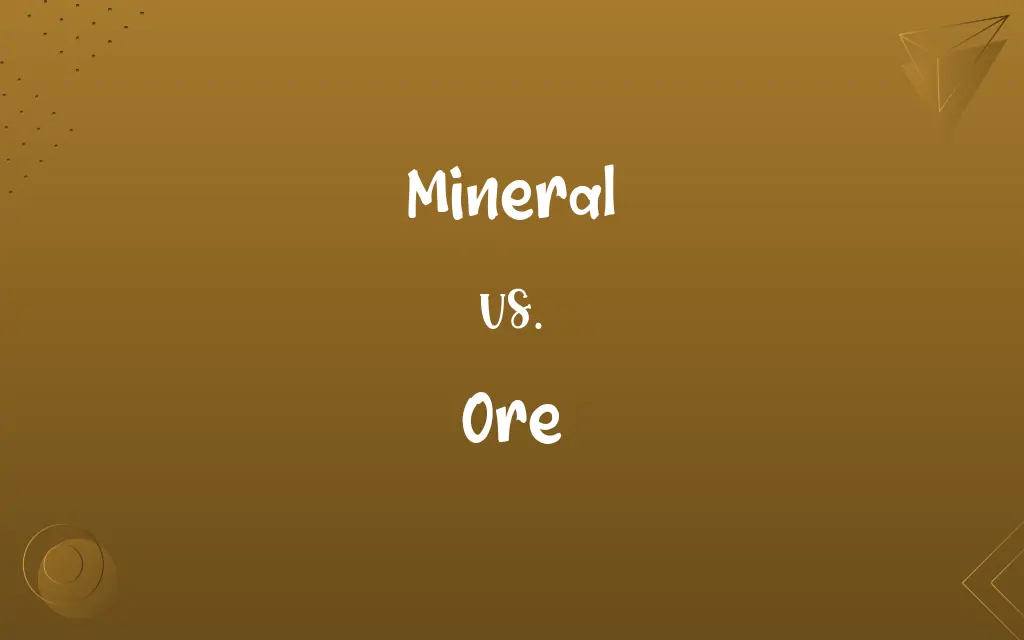Mineral vs. Ore: Know the Difference

By Shumaila Saeed || Updated on December 25, 2023
A mineral is a naturally occurring, inorganic solid with a definite chemical composition, while an ore is a type of mineral that contains a valuable substance that can be mined for profit.

Key Differences
Minerals are naturally occurring substances characterized by a definite chemical composition and crystalline structure. They are formed through geological processes and are found in the Earth's crust. Ores, on the other hand, are a type of mineral that contains a sufficient amount of a valuable element or compound, such as metal, which makes it economically feasible to extract.
Shumaila Saeed
Nov 16, 2023
The classification of a substance as a mineral depends on its chemical and physical properties, including its crystal form and hardness. Minerals are identified based on these characteristics. Ores are distinguished not just by their physical and chemical properties but also by the presence of a valuable substance that can be extracted at a profit.
Shumaila Saeed
Nov 16, 2023
While all ores are minerals, not all minerals qualify as ores. Minerals are abundant in nature and form the building blocks of rocks. In contrast, ores are those specific minerals from which metals or other valuable elements can be efficiently and profitably extracted.
Shumaila Saeed
Nov 16, 2023
The value of a mineral is determined by its rarity, physical properties, and aesthetic appeal, used in various applications like jewelry or industry. In contrast, the value of an ore is primarily determined by the presence and concentration of a specific valuable element or compound within it.
Shumaila Saeed
Nov 16, 2023
Finally, the study of minerals, mineralogy, encompasses a wide range of substances with no economic value, while the study of ores is often focused on their potential for industrial use, particularly in mining and metal extraction.
Shumaila Saeed
Nov 16, 2023
ADVERTISEMENT
Comparison Chart
Definition
Naturally occurring, inorganic solid
Mineral containing valuable substances for extraction
Shumaila Saeed
Nov 16, 2023
Economic Value
Value varies; not always economically valuable
Economically valuable for extracting a specific substance
Shumaila Saeed
Nov 16, 2023
Usage
Broad applications in various industries
Primarily used for extraction of metals and other resources
Shumaila Saeed
Nov 16, 2023
Abundance
Commonly found in Earth's crust
Less common; specific to regions with valuable substances
Shumaila Saeed
Nov 16, 2023
Study Field
Mineralogy focuses on various properties
Ore extraction focuses on feasibility and profit
Shumaila Saeed
Nov 16, 2023
ADVERTISEMENT
Mineral and Ore Definitions
Mineral
Characterized by a crystalline structure.
Diamonds, a form of carbon, are valued for their crystal clarity.
Shumaila Saeed
Nov 16, 2023
Ore
A mineral containing valuable substances.
Iron ore is mined for its iron content.
Shumaila Saeed
Nov 16, 2023
Mineral
Has a specific chemical composition.
Halite, composed of sodium chloride, is also known as rock salt.
Shumaila Saeed
Nov 16, 2023
Ore
Evaluated based on concentration of valuable substances.
High-grade uranium ore is critical for nuclear energy production.
Shumaila Saeed
Nov 16, 2023
Mineral
Formed through geological processes.
Garnet minerals are commonly found in metamorphic rocks.
Shumaila Saeed
Nov 16, 2023
ADVERTISEMENT
Ore
Economically feasible to extract.
Copper ore is processed to extract copper for industrial use.
Shumaila Saeed
Nov 16, 2023
Mineral
A naturally occurring, inorganic solid.
Quartz is a mineral known for its hardness and crystal structure.
Shumaila Saeed
Nov 16, 2023
Ore
Extracted through mining.
Gold ore is mined and refined to extract gold.
Shumaila Saeed
Nov 16, 2023
Mineral
Identified by unique physical properties.
Calcite reacts with acid, distinguishing it from similar minerals.
Shumaila Saeed
Nov 16, 2023
Ore
Contains metals or other valuable elements.
Bauxite ore is the primary source of aluminum.
Shumaila Saeed
Nov 16, 2023
Mineral
A naturally occurring, homogeneous inorganic solid substance having a definite chemical composition and characteristic crystalline structure, color, and hardness.
Shumaila Saeed
Oct 19, 2023
Ore
A mineral or an aggregate of minerals from which a valuable constituent, especially a metal, can be profitably mined or extracted.
Shumaila Saeed
Oct 19, 2023
Ore
Rock or other material that contains valuable or utilitarian materials; primarily a rock containing metals or gems for which it is typically mined and processed.
Shumaila Saeed
Oct 19, 2023
Mineral
A substance, such as stone, sand, salt, or coal, that is extracted or obtained from the ground or water and used in economic activities.
Shumaila Saeed
Oct 19, 2023
Mineral
A substance that is neither animal nor vegetable; inorganic matter.
Shumaila Saeed
Oct 19, 2023
Ore
The native form of a metal, whether free and uncombined, as gold, copper, etc., or combined, as iron, lead, etc. Usually the ores contain the metals combined with oxygen, sulphur, arsenic, etc. (called mineralizers).
Shumaila Saeed
Oct 19, 2023
Mineral
An inorganic element, such as calcium, iron, potassium, sodium, or zinc, that is essential to the nutrition of humans, animals, and plants.
Shumaila Saeed
Oct 19, 2023
Ore
A native metal or its compound with the rock in which it occurs, after it has been picked over to throw out what is worthless.
Shumaila Saeed
Oct 19, 2023
Ore
A monetary subunit in Denmark and Norway and Sweden; 100 ore equal 1 krona
Shumaila Saeed
Oct 19, 2023
Mineral
(geology) Any naturally occurring inorganic material that has a (more or less) definite chemical composition and characteristic physical properties.
Shumaila Saeed
Oct 19, 2023
Mineral
Any inorganic material (as distinguished from animal or vegetable).
Shumaila Saeed
Oct 19, 2023
Mineral
(nutrition) Any inorganic element that is essential to nutrition; a dietary mineral.
Shumaila Saeed
Oct 19, 2023
Mineral
An inorganic species or substance occurring in nature, having a definite chemical composition and usually a distinct crystalline form. Rocks, except certain glassy igneous forms, are either simple minerals or aggregates of minerals.
Shumaila Saeed
Oct 19, 2023
Mineral
Anything which is neither animal nor vegetable, as in the most general classification of things into three kingdoms (animal, vegetable, and mineral).
Shumaila Saeed
Oct 19, 2023
Mineral
Of or pertaining to minerals; consisting of a mineral or of minerals; as, a mineral substance.
Shumaila Saeed
Oct 19, 2023
Mineral
Solid homogeneous inorganic substances occurring in nature having a definite chemical composition
Shumaila Saeed
Oct 19, 2023
Mineral
Of or containing or derived from minerals;
A mineral deposit
Mineral water
Decaying vegetable matter
Shumaila Saeed
Oct 19, 2023
Mineral
Composed of matter other than plant or animal;
The inorganic mineral world
Shumaila Saeed
Oct 19, 2023
Repeatedly Asked Queries
Can all minerals be considered ores?
No, only minerals with economically valuable substances in sufficient quantities are considered ores.
Shumaila Saeed
Nov 16, 2023
What is an ore?
An ore is a type of mineral that contains a valuable substance that can be profitably extracted.
Shumaila Saeed
Nov 16, 2023
What defines a mineral?
A mineral is a naturally occurring inorganic solid with a specific chemical composition and crystalline structure.
Shumaila Saeed
Nov 16, 2023
Are ores always metallic?
No, ores can contain non-metallic valuable substances as well.
Shumaila Saeed
Nov 16, 2023
What is the main use of minerals?
Minerals have various uses, including industrial applications, jewelry, and construction.
Shumaila Saeed
Nov 16, 2023
Can the value of a mineral change?
Yes, a mineral's value can change based on market demand and rarity.
Shumaila Saeed
Nov 16, 2023
Are all ores profitable to extract?
Not all ores are profitable; it depends on the concentration of the valuable substance and extraction costs.
Shumaila Saeed
Nov 16, 2023
What makes an ore viable for extraction?
The concentration of the valuable substance and the feasibility of extraction determine an ore's viability.
Shumaila Saeed
Nov 16, 2023
Why are ores important?
Ores are important for the extraction of metals and other valuable elements they contain.
Shumaila Saeed
Nov 16, 2023
Do minerals have economic value?
Some minerals have economic value, while others are valued for their scientific or aesthetic properties.
Shumaila Saeed
Nov 16, 2023
Can minerals be used as energy sources?
Some minerals, like uranium, are used as energy sources.
Shumaila Saeed
Nov 16, 2023
What factors affect ore extraction?
Factors include the type of ore, location, depth of deposits, and environmental regulations.
Shumaila Saeed
Nov 16, 2023
Is mining the only way to obtain ores?
Mining is the primary method, but some ores can also be obtained through other methods like leaching.
Shumaila Saeed
Nov 16, 2023
Can minerals be synthetic?
Yes, synthetic minerals can be created in laboratories, but natural minerals form through geological processes.
Shumaila Saeed
Nov 16, 2023
How are minerals classified?
Minerals are classified based on their chemical composition and crystal structure.
Shumaila Saeed
Nov 16, 2023
How is the quality of an ore determined?
Ore quality is determined by the concentration and accessibility of the valuable substance it contains.
Shumaila Saeed
Nov 16, 2023
What is the environmental impact of ore extraction?
Ore extraction can have significant environmental impacts, including habitat destruction and pollution.
Shumaila Saeed
Nov 16, 2023
Can the composition of an ore vary?
Yes, the composition of an ore can vary depending on the location and geological conditions.
Shumaila Saeed
Nov 16, 2023
Are minerals renewable?
No, minerals are non-renewable resources formed over geological time scales.
Shumaila Saeed
Nov 16, 2023
Share this page
Link for your blog / website
HTML
Link to share via messenger
About Author
Written by
Shumaila SaeedShumaila Saeed, an expert content creator with 6 years of experience, specializes in distilling complex topics into easily digestible comparisons, shining a light on the nuances that both inform and educate readers with clarity and accuracy.
































































